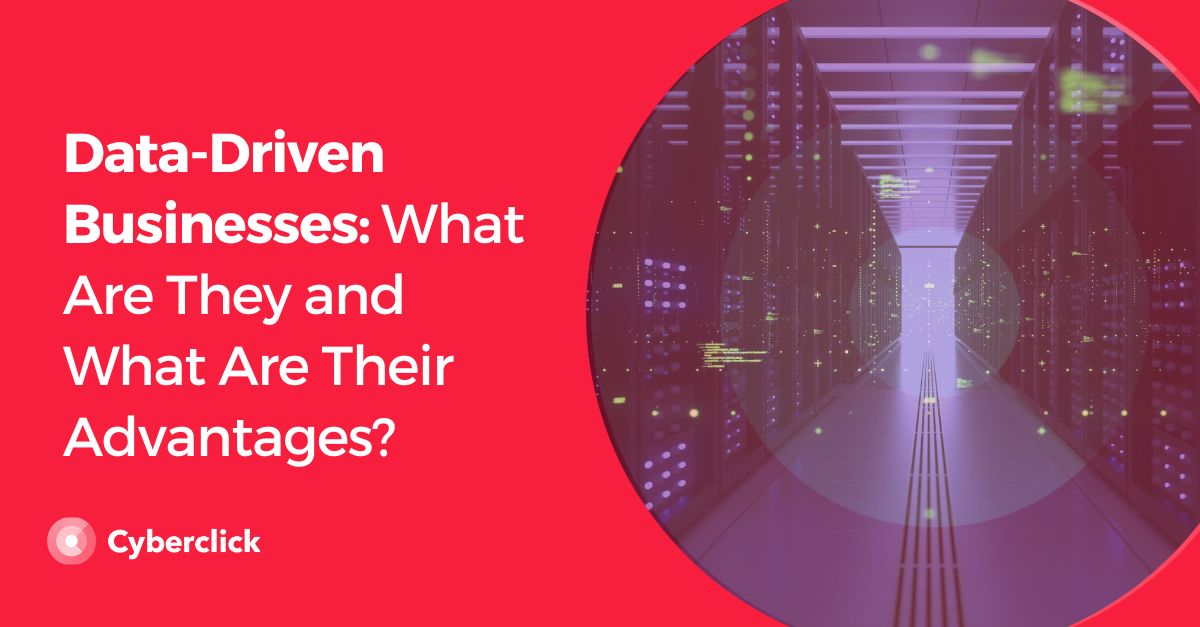We’re sharing different digital marketing trends for 2023 on our blog, and in this article we want to take a look at an often overlooked area: CRMs.
Following the digitalization imposed by the pandemic, consumer expectations have risen. According to Talkdesk, 58% of customers expect better service than last year. And to give them that service, having a good CRM is key.
According to Fortune, the CRM market will grow at a compound annual growth rate of 12.5% to reach $145.79 billion by 2029. Let's take a look at the CRM trends that will define the future of this sector.

13 CRM Trends for Your 2023 Marketing Strategy
1) Better Understand the Customer with a CRM
Traditionally, CRM was a way to track marketing contacts and do lead nurturing. But now they are becoming a means to better understand our customers.
CRMs collect a wealth of data on each individual customer, allowing sales and customer service teams to build detailed profiles of each customer they come into contact with.
This detailed view of customers is very useful for the entire company, but particularly for sales teams. According to a recent industry report (Chang, 2021), 70% of salespeople believe CRMs are "very important" for closing sales. Furthermore, according to LinkedIn, 49% of sales professionals plan to use this technology more in the future.
Ultimately, CRMs give us access to a wealth of data about our customers, updated in near real-time. It is our responsibility to properly process this data and use it to build detailed profiles that facilitate the work of the entire company.
2) Increased Use of CRM by Teams and Companies
CRM trends suggest that its use will become popular among all company departments, not just those that work directly with customers, such as sales and customer service.
CRM experts indicate that it is likely that in the next few years this tool will be adopted throughout the enterprise, as companies will realize that they are underutilizing CRM systems and therefore not taking advantage of their full potential. According to a recent study, 80% of companies are aware that a CRM is not only useful for helping sales and customer service departments.
Therefore, in the coming year we expect to see advances in CRM adoption at all levels.
3) Social CRM Is a Growing Practice
Social CRM is about integrating social channels into customer relationship management platforms, a practice that makes sense when you consider that 65% of customer service teams use social networks. This allows you to integrate traditional channels with social channels to improve both customer service and marketing data.
Social CRM has been part of marketing best practices since 2020, and companies continue to use social channels to learn more about their customers. To facilitate this, today's CRMs integrate seamlessly with popular social networks such as Facebook, Twitter and LinkedIn.
In addition to integrating social media channels into their existing customer relationship platforms, companies can also use standalone social CRM solutions. With these tools, companies can learn a lot of things about their customers, such as what their buying habits are and what they think about their products. All of this contributes to getting to know our customers better and better.
4) The Technological Future of CRM
In recent years, not only has the use of CRMs evolved, but also their technological features. Today, many CRM tools have advanced sales and marketing as well as customer relationship management functionality. As more companies incorporate these tools, they will be able to reduce the number of technologies they use, which will help them become more productive and reduce overall technology spending.
To take full advantage of the benefits of CRM, companies should synchronize data between the different tools used in different departments of the company. This synchronization of data ensures that customer information is always up to date, regardless of location.
5) Centralization of All Corporate Tasks in the CRM
The next technological step for CRM is to integrate customer management platforms into all business processes.
Customer behavior is increasingly evolving towards virtual interactions, which makes the importance of maintaining an efficient CRM system greater than ever. By integrating a CRM with other corporate programs and tools, companies can build a single, complete view of each customer and eliminate data silos within the organization. In turn, marketing systems can use this single source of information to craft highly personalized customer journeys. And these personalized customer journeys serve to enhance loyalty.
Today most CRM tools are ready to integrate with a wide variety of marketing software, including email marketing platforms. Synchronizing data between CRM and marketing systems ensures that customer contact data is always up to date. And this integration also reduces the hassle of dealing with duplicate emails.
6) The Rise of Channel-Less CRM
We all know the benefits of developing omni-channel marketing strategies. But CRM trends for 2023 go one step further and point to the fact that companies will soon start adopting a channel-less strategy.
Unlike omnichannel CRM, which involves meeting customers on all the channels they use, the channel-less CRM approach places less emphasis on communication channels. The idea behind it is that customers don't care about companies' initiatives to align communication with customers, and therefore agents shouldn't care either. Instead, sales and customer service agents should focus on delivering a seamless, relevant and highly personalized customer experience.
In channel-less CRM strategies, the customer is at the center of end-to-end CRM processes. To enable these, CRM tools are expected to be able to integrate advanced technologies that enable more intensive customer data collection.
7) Smart CRMs Thanks to AI
One common aspect of marketing trends is that they closely follow technological advances. And in recent years, this means that artificial intelligence is increasingly present in the day-to-day lives of marketers.
The integration of artificial intelligence into CRMs will significantly influence the way CRMs are used. According to Infoholic Research, the AI-based CRM market will be valued at 73 million by 2023.
One of the most important benefits of integrating AI into CRMs is the ability to quickly process large volumes of unstructured data and extract meaning from it. Thanks to this technology, we will be able to identify patterns and trends in consumer buying behavior and perform more accurate segmentation than ever before.
In addition, AI will be able to provide personalized recommendations at different points in the sales funnel, make predictions about leads and conversions, and improve customer support through chatbots.
8) CRMs Will Continue to Benefit IoT Devices
The integration of the internet of things into CRM is not new, but it is one of the CRM trends that will continue to grow in the coming years. The adoption of IoT devices continues to increase.
Many CRM systems have built in integrations with IoT feeds from a wide variety of devices. By offering more data sources, this technology will improve CRM management and provide more in-depth information about customer behavior.
Another advantage of integrating IoT into CRMs is that devices will be able to send information about faults and problems directly to the CRM, which will help customer support teams to be more proactive and improve satisfaction.
9) Self-Service CRMs Will Be the Standard
B2B customers are becoming more and more independent and are looking for ways to solve problems with products and services on their own. Therefore, most CRM users expect companies to have self-service portals. Through them, customers can gain access to resources such as knowledge bases and user forums.
Increasingly, these self-service portals are integrated within the CRM software itself. With these integrations, companies gain insight into their customers' most frequent problems and can anticipate their needs. In addition, many CRM systems today also feature chatbots that can solve common customer questions and send personalized offers, all while collecting valuable customer data.
10) CRM for Entrepreneurs and Freelancers
CRM platforms are becoming more complex and sophisticated, but fortunately, also more accessible. Today, we can find solutions on the market with different prices and functionalities, which makes more and more entrepreneurs and freelancers encouraged to use this type of tools. According to Pofeldt, entrepreneurs who have reached over $1 million in revenue tend to use CRMs.
CRMs have essential functionality for freelancers and entrepreneurs, from contact management to bid management to invoicing. All of which can be very useful for professionals who have to manage multiple clients at once, leaving them more time to grow their businesses.
11) CRMs with Speech Recognition and Conversational User Interfaces
As with artificial intelligence, voice technologies have the potential to enhance the capabilities of CRM tools. Speech recognition makes software more accessible and easier to use. For example, teams can use speech-to-text functionality to speed up data entry and easily record meetings to keep documentation up to date.
Industry experts expect more and more CRM tools to adopt a conversational user interface, allowing professionals to interact with CRM systems intuitively through a wide range of verbal and written phrases. Through these simple interactions, teams will be able to quickly access customer data, enter new information, generate reports and prioritize tasks.
12) CRMs Will Automate Business Workflows
Automation is a global marketing trend that has reached CRMs. Many CRMs have begun offering features to help teams automate routine tasks, such as updating customer data, sharing documents or sending emails.
Since these types of tasks account for up to 60% of skilled professionals' time, leaving them to automation allows them to focus on more valuable aspects of the business in the long run, such as mapping customer journeys or analyzing data collected through the CRM. For this reason, 41% of companies are already considering automating contact with current and potential customers through recommendations generated by artificial intelligence and machine learning.
13) Virtual PBXs Connected to CRM
A virtual PBX is a telephone system hosted in the cloud that manages internal and external calls efficiently, using customized functionalities.
A virtual PBX offers the company complete control of its internal and external communications by voice, chat or video.
The advantages of integrating a virtual PBX with CRM are endless. For example, if you integrate Hubspot with a PBX, it allows you to have all customer data in the contact file to track daily sales activities, record incoming and outgoing calls in the contact file itself, have a call history along with call recording, monitor the customer at all times and many more points.
Responsable de la estrategia de contenidos y visibilidad en Cyberclick, con enfoque Allbound y especialización en posicionamiento SEO, GEO y automatización con IA. Gestión avanzada del CRM con HubSpot: base de datos, workflows, lead nurturing, scoring y reporting. Experiencia en marketing digital, comunicación corporativa y periodismo, uniendo estrategia, creatividad y tecnología para captar y convertir leads cualificados.
Responsible for content and brand visibility strategy at Cyberclick, with an Allbound approach and specialization in SEO, GEO (Generative Engine Optimization), and AI-powered automation. Advanced HubSpot CRM management: database segmentation, workflows, lead nurturing, scoring, and reporting. Background in digital marketing, corporate communications, and journalism—combining strategy, creativity, and technology to attract and convert qualified leads.






Leave your comment and join the conversation